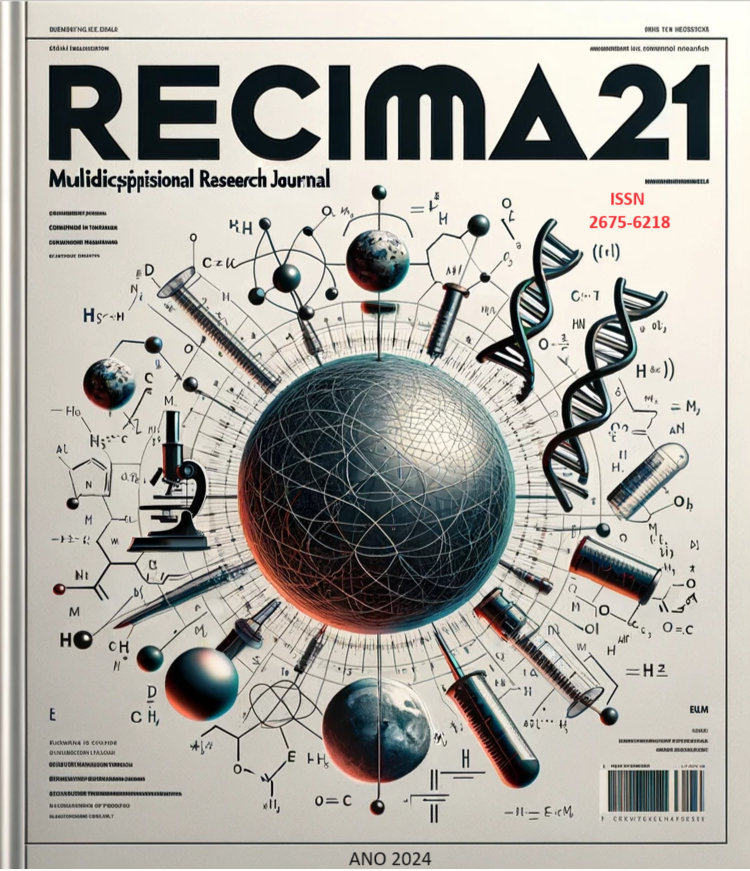IMPACTS OF CANNABIS USE IN INDIVIDUALS WITH ADHD: COGNITIVE EFFECTS, DECISIONS AND POSSIBLE THERAPEUTIC BENEFITS
DOI:
https://doi.org/10.47820/recima21.v5i10.5768Keywords:
Alternative therapy, Strategic it Management, CannabidiolAbstract
Attention Deficit Hyperactivity Disorder (ADHD) is one of the most common neuropsychiatric disorders in childhood and adolescence, characterized by persistent symptoms of inattention, hyperactivity, and impulsivity. Recent studies indicate that individuals with ADHD have a significantly higher propensity for cannabis use compared to the general population. Objective: to explore the impacts of cannabis use in individuals with ADHD. Materials and methods: this is an integrative review, in which the guiding question was “What is the impact of cannabis use in individuals with ADHD compared to those who do not use cannabis, with regard to cognitive effects, decision-making, and ADHD symptoms?”. The search for articles was carried out in PubMed using the terms “attention deficit disorder” and “cannabis”, combined with each other by Boolean operators. Results and discussion: The cognitive effects of occasional and chronic cannabis use include impaired verbal learning, memory, and attention, with psychomotor reduction in acute intoxication. Importantly, several studies have found that acute THC administration impaired decision-making and increased risk-taking in both recreational and regular cannabis users compared with non-users. Conclusion: Further studies of cannabis users with comparable use histories and co-occurring ADHD are needed to better elucidate the effects of cannabis on cognition in this population, especially considering general beliefs about the therapeutic benefits of cannabis-derived products.
Downloads
References
AHLERS, Joachim et al. Cannabis use in adults who screen positive for attention deficit/hyperactivity disorder: CANreduce 2.0 Randomized Controlled Trial Subgroup Analysis. Journal of Medical Internet Research, v. 24, n. 4, p. e30138, 2022. DOI: https://doi.org/10.2196/30138
BURGGREN, Alison C. et al. Cannabis effects on brain structure, function, and cognition: considerations for medical uses of cannabis and its derivatives. The American journal of drug and alcohol abuse, v. 45, n. 6, p. 563-579, 2019. DOI: https://doi.org/10.1080/00952990.2019.1634086
COOPER, Ruth E. et al. Cannabinoids in attention-deficit/hyperactivity disorder: A randomised-controlled trial. European Neuropsychopharmacology, v. 27, n. 8, p. 795-808, 2017. DOI: https://doi.org/10.1016/j.euroneuro.2017.05.005
DE SOUSA, Luís Manuel Mota et al. A metodologia de revisão integrativa da literatura em enfermagem. Revista investigação em enfermagem, v. 21, n. 2, p. 17-26, 2017.
DHAMIJA, Divyanshu et al. Cannabis Use in Patients With Attention Deficit Hyperactivity Disorder-A Benefit or a Curse: A Systematic Review. Cureus, v. 15, n. 6, 2023. DOI: https://doi.org/10.7759/cureus.40969
ERCOLE, Flávia Falci; MELO, Laís Samara de; ALCOFORADO, Carla Lúcia Goulart Constant. Revisão integrativa versus revisão sistemática. Reme: Revista Mineira de Enfermagem, v. 18, n. 1, p. 09-11, 2014. DOI: https://doi.org/10.5935/1415-2762.20140001
FARAONE, Stephen V. et al. Author Correction: Attention-deficit/hyperactivity disorder. Nature reviews. Disease primers, v. 10, n. 1, p. 29, 2024. DOI: https://doi.org/10.1038/s41572-024-00518-w
GUJSKA, Julia Helena et al. Exploring the link between attention-deficit hyperactivity disorder and Cannabis use disorders: a review. Medical Science Monitor: International Medical Journal of Experimental and Clinical Research, v. 29, p. e939749-1, 2023. DOI: https://doi.org/10.12659/MSM.939749
HERNANDEZ, Mariely; LEVIN, Frances R. Attention-deficit hyperactivity disorder and therapeutic cannabis use motives. Psychiatric Clinics of North America, v. 45, n. 3, p. 503-514, 2022. DOI: https://doi.org/10.1016/j.psc.2022.05.010
ITTIPHAKORN, Pim et al. UK Medical Cannabis Registry: an analysis of clinical outcomes of medicinal cannabis therapy for attention‐deficit/hyperactivity disorder. Neuropsychopharmacology Reports, v. 43, n. 4, p. 596-606, 2023. DOI: https://doi.org/10.1002/npr2.12400
JEAN, François Arnaud Matthieu et al. Attention deficit hyperactivity disorder symptoms and cannabis use after 1 year among students of the i-Share cohort. European Psychiatry, v. 65, n. 1, p. e25, 2022. DOI: https://doi.org/10.1192/j.eurpsy.2022.14
MACDONALD, Benjamin; SADEK, Joseph. Naturalistic exploratory study of the associations of substance use on ADHD outcomes and function. BMC psychiatry, v. 21, n. 1, p. 251, 2021. DOI: https://doi.org/10.1186/s12888-021-03263-6
MAGNUS, W.; NAZIR, S.; ANILKUMAR, A. C. Attention Deficit Hyperactivity Disorder. In: StatPearls [Internet]. Treasure Island (FL): StatPearls Publishing, 2024.
MANSELL, Holly et al. Cannabis for the treatment of attention deficit hyperactivity disorder: a report of 3 cases. Medical cannabis and cannabinoids, v. 5, n. 1, p. 1-6, 2022. DOI: https://doi.org/10.1159/000521370
MANSELL, Holly et al. Pharmacokinetics and perceptions of children and young adults using cannabis for attention-deficit/hyperactivity disorder and oppositional defiant disorder: Protocol for a mixed methods proof-of-concept study. JMIR Research Protocols, v. 10, n. 10, p. e31281, 2021. DOI: https://doi.org/10.2196/31281
MENDES, Karina Dal Sasso; SILVEIRA, Renata Cristina de Campos Pereira; GALVÃO, Cristina Maria. Revisão integrativa: método de pesquisa para a incorporação de evidências na saúde e na enfermagem. Texto & contexto-enfermagem, v. 17, p. 758-764, 2008. DOI: https://doi.org/10.1590/S0104-07072008000400018
MOLINERO, Karla; HINCKLEY, Jesse D. Adolescent cannabis use, comorbid attention-deficit/hyperactivity disorder, and other internalizing and externalizing disorders. Child and adolescent psychiatric clinics of North America, v. 32, n. 1, p. 57-68, 2023. DOI: https://doi.org/10.1016/j.chc.2022.07.003
Downloads
Published
License
Copyright (c) 2024 RECIMA21 - Revista Científica Multidisciplinar - ISSN 2675-6218

This work is licensed under a Creative Commons Attribution 4.0 International License.
Os direitos autorais dos artigos/resenhas/TCCs publicados pertecem à revista RECIMA21, e seguem o padrão Creative Commons (CC BY 4.0), permitindo a cópia ou reprodução, desde que cite a fonte e respeite os direitos dos autores e contenham menção aos mesmos nos créditos. Toda e qualquer obra publicada na revista, seu conteúdo é de responsabilidade dos autores, cabendo a RECIMA21 apenas ser o veículo de divulgação, seguindo os padrões nacionais e internacionais de publicação.













